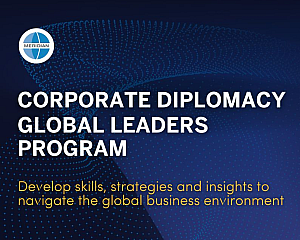Navigating the New Diplomatic Landscape: Corporate Diplomacy in a Changing World
Companies have become central diplomatic actors in addressing the world's shared challenges. Strategic economic competition, hot and cold wars, new trade and supply chain dynamics, and disruptive technology have impacted the daily activities of businesses, presenting significant corporate and reputation risks and missed opportunities. Stakeholders now expect companies to have a broader vision and long-term strategies that go beyond profit. The private sector now serves as new, powerful diplomatic actors, trusted more than the government and the media.
The future of diplomacy depends on greater cooperation between the private sector, government, and civil society. Business leaders need deeper geopolitical insights, more robust networks, more diplomatic resources, and a platform to bridge gaps between business, government, and diplomatic leaders to make stronger decisions.
Meridian International Center CEO Ambassador Stuart Holliday's leading takeaway on why corporate diplomacy is essential for every company is this: "In an increasingly competitive and polarized world, the private sector can provide strategic continuity and deepen U.S. engagement."
Here are the other top five reasons why corporate diplomacy is an essential tool for business leaders to mitigate risk and expand international opportunities:
-
1. Your team is your asset. As an individual, you have unique perspectives and experiences that lend crucial insight when problem-solving or answering questions. The same goes for your colleagues. Utilizing the team's diverse skillsets and knowledge bases is essential when taking on complex issues or projects. Collaboration is critical to creating comprehensive solutions.
2. Business is an art, and art forms vary. Doing any business requires tact and thoughtfulness. First impressions matter so homework about your business partner is so important. Especially when working alongside international leaders and business professionals, being aware of cultural norms will ensure you are respectful and prepared, elevating your image and increasing the likelihood of a successful business relationship. Being prepared and deliberate about curating the environment you meet in or the gifts you exchange is an underrated form of soft power.
3. Make a plan for every outcome. Have a plan before you need to use it. This is especially important for significant government transitions, such as the transition between presidents after each election. Planning how your company will proceed during such a transition will set you up for success. Outlining how each candidate's policies may affect your company, researching who in each administration to engage with, and knowing who will control Congress are all great ways to prepare a company for change.
4. No one loses in a negotiation. Negotiation is an essential facet of business; however, approaching negotiation through a "joint problem-solving" lens will ensure both parties meet their individual and shared interests. Many people see a negotiation as a zero-sum game, but the pie you are bargaining over is not a fixed value; it can be expanded. Ask questions to understand the other party's goals and interests, and you might uncover bargaining material you didn't have before.
5. We see less than we think. Studies have shown that our eyes only take in so much information, and the rest of the picture is filled with what we assume should be there. Confidence is essential, but it is arguably more important to leave your assumptions at the door and take extra care with your work. This point brings together the other four takeaways to articulate the importance of being diplomatic in our business relationships.
Corporate Diplomacy recognizes the importance of strategic relationships, effective communication, and responsible business practices. Global engagement and geopolitical awareness are quickly becoming indispensable features of the corporate landscape, and a top priority is ensuring our emerging leaders are prepared to face any challenge or situation.
On February 29, Meridian International Center hosted the third iteration of the Corporate Diplomacy Global Leaders Program (CDGLP). Led by high-level diplomatic officials and corporate leaders from varying disciplines, this program equips rising leaders with essential diplomatic strategy, insight, and networks to protect and advance business insights and navigate new and complex issues facing the modern world.
Participants apply to attend a day-long program featuring engaging discussions, roundtable networking, and fireside chats with instructors on government engagement strategy, diplomatic protocol, and pressing geopolitical events.
The next CDGLP cohort will convene at Meridian International Center on May 22, 2024. Apply or nominate a rising leader from your organization to participate in Meridian's Corporate Diplomacy Global Leaders Cohort program here. If you have any questions about the program, please email corporatediplomacy@meridian.org.
Project summary
| Navigating the New Diplomatic Landscape: Corporate Diplomacy in a Changing World | |
|---|---|
| Number of Visitors: | 30 |
| Impact Areas: | Business and Trade, Foreign Policy, Public Diplomacy |
| Program Areas: | Corporate Diplomacy |
